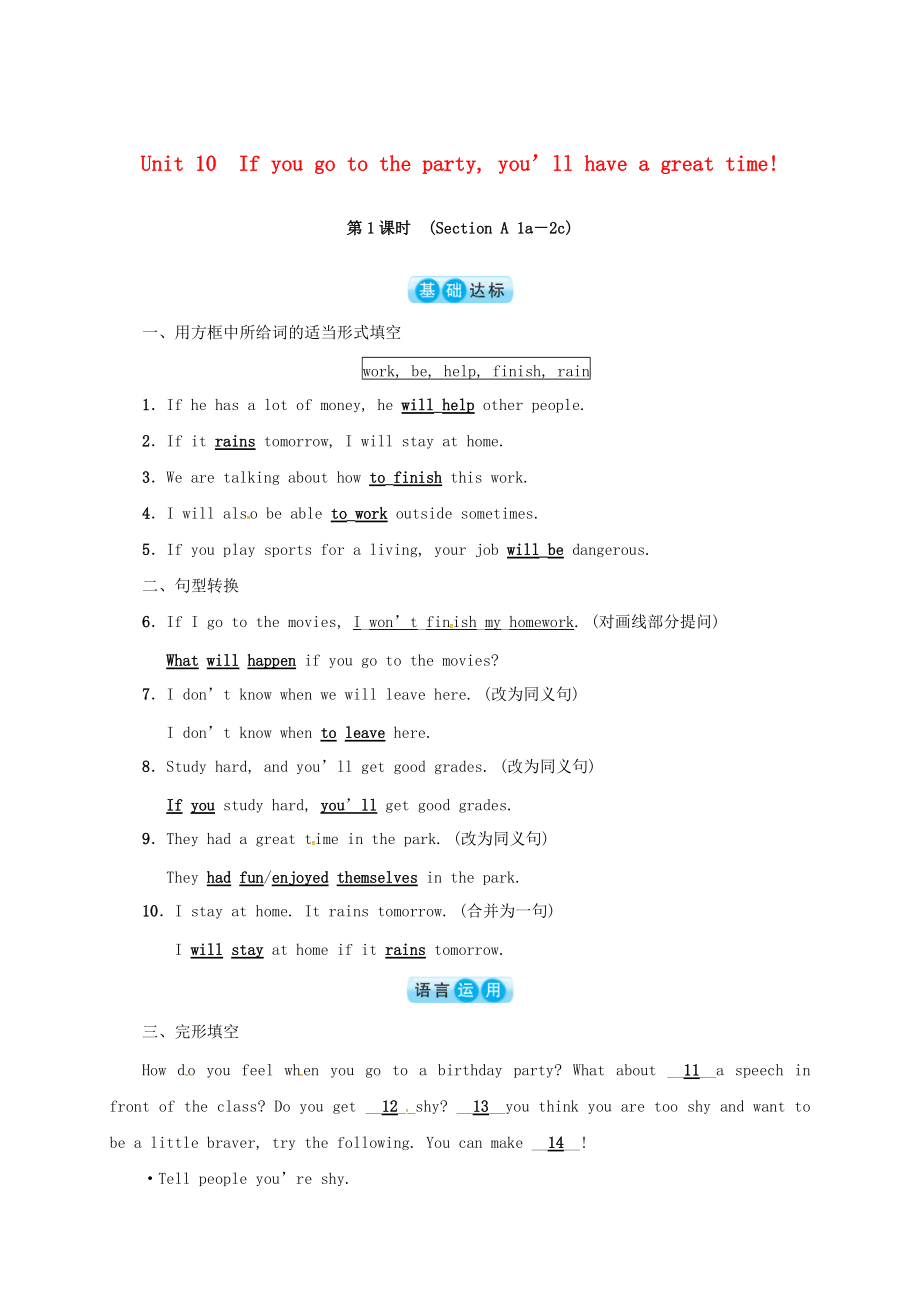《八年級英語上冊 Unit 10 If you go to the partyyou’ll have a great time第1課時同步練習(xí) 新版人教新目標(biāo)版》由會員分享��,可在線閱讀��,更多相關(guān)《八年級英語上冊 Unit 10 If you go to the partyyou’ll have a great time第1課時同步練習(xí) 新版人教新目標(biāo)版(3頁珍藏版)》請在裝配圖網(wǎng)上搜索��。
1��、
Unit 10 If you go to the party, you’ll have a great time!
第1課時 (Section A 1a-2c)
一��、用方框中所給詞的適當(dāng)形式填空
work, be, help, finish, rain
1.If he has a lot of money, he will_help other people.
2.If it rains tomorrow, I will stay at home.
3.We are talking about how to_finish this work.
4.I will also
2��、be able to_work outside sometimes.
5.If you play sports for a living, your job will_be dangerous.
二��、句型轉(zhuǎn)換
6.If I go to the movies, I_won’t_finish_my_homework. (對畫線部分提問)
What will happen if you go to the movies?
7.I don’t know when we will leave here. (改為同義句)
I don’t know when to leave her
3��、e.
8.Study hard, and you’ll get good grades. (改為同義句)
If you study hard, you’ll get good grades.
9.They had a great time in the park. (改為同義句)
They had fun/enjoyed themselves in the park.
10.I stay at home. It rains tomorrow. (合并為一句)
I will stay at home if it rains tomorrow.
三��、完形填空
4��、
How do you feel when you go to a birthday party? What about __11__a speech in front of the class? Do you get __12__shy? __13__you think you are too shy and want to be a little braver, try the following. You can make __14__!
·Tell people you’re shy.
There is no need to hide (隱藏) it. When they
5��、 get __15__ you’re a shy kid, they’ll understand you __16__. This also helps you feel more at ease (自在) in talks.
·Try __17__ more.
When you smile, people think you are __18__ and easy to talk to. Remember that other people have feelings, __19__. And most people will stay away from __20__ ang
6��、ry-looking person.
·Learn __21__ a good talker.
If you find it hard to start talks, say something nice about people around you. Think about __22__ great you feel when someone says something nice to you.
·Get your attention(注意) elsewhere.
Think more about ways to enjoy the party __23__
7��、the game. Don’t waste(浪費(fèi)) time __24__ about your looks or __25__ people like you or not.
(C)11.A. make B. made
C. making D. to make
(B)12.A. real B. really
C. mainly D. main
(A)13.A. If B. But
C. So D. However
(D)14.A. her B. him
C. them D.
8、 it
(C)15.A. know B. known
C. to know D. knew
(B)16.A. good B. better
C. well D. fine
(C)17.A. laugh B. laughed
C. to smile D. smiled
(A)18.A. friendly B. easy
C. angry D. serious
(B)19.A. as well B. too
C. either D. also
9��、
(D)20.A. / B. the
C. a D. an
(A)21.A. to be B. be
C. being D. was
(C)22.A. what B. when
C. how D. where
(C)23.A. if B. whether
C. or D. like
(B)24.A. worried B. worrying
C. worry D. to worry
(D)25.A. when B. if
C
10��、. or D. whether
四��、語法填空
My father comes from China. And my mother is 26.an American. I lived in China when I was young. Then I moved to the United States when I was twelve years old. I was able to see the 27.differences(different) between Chinese and American customs(風(fēng)俗). For example, if Chinese
11��、people go to 28.others’(other) houses, they will buy gifts for their friends. Americans will not usually buy gifts. They only buy gifts 29.on their friends’ birthdays or for some other big celebrations. Chinese people feel it is not polite(禮貌的) if they don’t give gifts, but Americans think 30.it is
12��、very strange(奇怪的) 31.to_give(give) gifts. Chinese people are too polite. If you ask them 32.to_sit(sit), you must ask them many times, or they will not sit at all. Another point is, if Chinese people invite others to their homes, they will make their children say “hello” to the guests and pour tea o
13��、r talk with the guests. 33.However,_American children do not have to do these things. They think that the guests are their parents’ friends but not 34.theirs(they). Because I grew up in these two cultures, I believe that I can get on 35.well(good) with both Chinese people and American people.
我國經(jīng)濟(jì)發(fā)展進(jìn)入新常態(tài)��,需要轉(zhuǎn)變經(jīng)濟(jì)發(fā)展方式��,改變粗放式增長模式��,不斷優(yōu)化經(jīng)濟(jì)結(jié)構(gòu)��,實現(xiàn)經(jīng)濟(jì)健康可持續(xù)發(fā)展進(jìn)區(qū)域協(xié)調(diào)發(fā)展��,推進(jìn)新型城鎮(zhèn)化��,推動城鄉(xiāng)發(fā)展一體化因:我國經(jīng)濟(jì)發(fā)展還面臨區(qū)域發(fā)展不平衡��、城鎮(zhèn)化水平不高��、城鄉(xiāng)發(fā)展不平衡不協(xié)調(diào)等現(xiàn)實挑戰(zhàn)��。
 八年級英語上冊 Unit 10 If you go to the partyyou’ll have a great time第1課時同步練習(xí) 新版人教新目標(biāo)版
八年級英語上冊 Unit 10 If you go to the partyyou’ll have a great time第1課時同步練習(xí) 新版人教新目標(biāo)版

